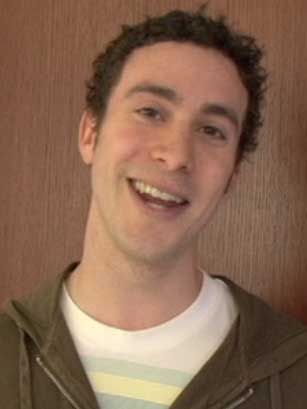Barry Goldenberg: The Bus Stops Here
Growing up in a suburb of St. Louis, Barry Goldenberg never thought he would end up in New York City pursuing a graduate degree in education. But he now looks back on his high school years at Parkway Central in Chesterfield, Missouri, which had one of the largest desegregation busing programs in the country, as a catalyst for his interest in educational disparities.
“I was aware of such inequalities” recalls Goldenberg, “but I never really thought deeply about why they exist and the consequences of these inequalities.”
That changed when Goldenberg went to UCLA. “The urban life of Los Angeles greatly impacted my world view” he says. He took an elective education class with Ernest Morrell, a Professor of English Education, who has since come to TC to head the Institute of Urban and Minority Education (IUME) in Harlem. Goldenberg found Morrell’s class at UCLA “totally inspiring. It opened my eyes to the challenges in urban education. Issues of equity and schooling totally grabbed me. It wasn’t necessarily trouble in city schools that grabbed me. It was, and remains, the idea that there are schools that are under-funded and marginalized. And unfortunately, as we know, these schools are primarily in urban areas. I thought about my high school friendships with students who had been bused in from St. Louis and other educational experiences I had had, and I wanted to be part of the solution.”
Morrell became a mentor and, when both ended up at TC, offered Goldenberg a part-time job at IUME. With the assistance of a TC Dean’s Grant this past year, Goldenberg created and ran Youth Historians in Harlem, a pilot program that worked with 10 students at nearby Frederick Douglass Academy II teaching them to “do” history by developing the research skills of a historian. Specifically, the students researched the history of theirHarlem community.
The program’s primary objective is to turn students who weren’t all that interested in history into historians, but in a non-traditional way. Rather than having them read histories of places they had never heard of and perhaps never visit, Goldenberg wanted to test whether his students could be engaged in history as a discipline by researching the history of their own community and places they knew. Recalling an earlier conversation with Morrell, Goldenberg says, “For students to learn about Mesopotamia, they first have to learn about the history of their own block.”
Goldenberg also wanted to see whether the project would help improve their reading, writing and critical thinking skills along the way. Preliminary results show that it is possible.
Goldenberg, who received a master’s degree in History and Education in May, became so engaged in his work in Harlem that he decided to stay at TC, pursue a doctorate degree in History and Education, and expand Youth Historians this fall to include more adults and community institutions. He wants to continue his pilot study and dig deeper, to examine how students, families and teachers – an entire community – can benefit from more awareness of their own history.
“I want to look at how we can impact the community through developing historical narratives of the community,” Goldenberg says, “and how we can involve the community, including teachers and students, in creating those narratives.”
As for his own historical research, Goldenberg is interested in the history of youth activism in and around Harlem in the 50s and 60s and in thinking about how that activism connects to today. Goldenberg hopes this scholarship can add to and enrich Educating Harlem, a new initiative of IUME and the Program in History and Education, which is focused on expanding the under-studied educational history of Harlem. Educating Harlem began this past year with a speaker series and will continue in the coming year with a fall conference, among other activities.
Goldenberg considers himself “very fortunate to end up” at Teachers College. “New York City is the pinnacle of urban education, which is what I want to study, and Columbia Teachers College is the top. When I got in, I just thought, ‘I have to do this, I have to go.’ ”
Published Monday, Jul. 1, 2013
